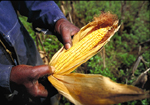| Sustainable Food Guide | Environmental Practice at Work © 2005  |
|
Issues
| GM & Law... International. The Precautionary Principle was agreed at the UN in 1992 as part of the Rio Declaration (Principle 15) states: "where there are threats of serious or irreversible damage lack of full scientific certainty shall not be used as a reason for postponing cost-effective measures to prevent environmental degradation". This is not considered "hard" law. The EU Commissioner for Health and Consumer Protection said the Precautionary Principle "is a legitimate regulatory tool to be used in particular circumstances such as where a risk is identified but the scientific consensus is uncertain as to either its nature or its extent." The EU used the principle in 1999 to halt the application for a genetically modified maize seed. Cartegena Protocol International Union for the Protection of New Varieties of Plants (UPOV) "The first international treaty bringing intellectual property (IP) into agriculture was drawn up in Europe to harmonise and support existing national systems that give commercial plant breeders' rights over the plant varieties they breed, and to promote the system in other countries. This system of plant breeders' rights was an alternative to the US approach of allowing plant patents. Since the TRIPS agreement, all WTO members who have signed up to UPOV must provide some form of IP protection for plant varieties." from Chap 2 of Future Control of Food (see box). Cartegena & UPOV links (pdf) European
| ||||||||
| Photos courtesy of http://www.usda.gov |


